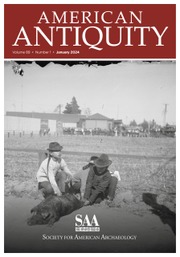Crossref Citations
This article has been cited by the following publications. This list is generated based on data provided by
Crossref.
Deevey, E. S.
Rice, Don S.
Rice, Prudence M.
Vaughan, H. H.
Brenner, Mark
and
Flannery, M. S.
1979.
Mayan Urbanism: Impact on a Tropical Karst Environment.
Science,
Vol. 206,
Issue. 4416,
p.
298.
Jones, Grant D.
Rice, Don S.
and
Rice, Prudence M.
1981.
The Location of Tayasal: A Reconsideration in Light of Peten Maya Ethnohistory and Archaeology.
American Antiquity,
Vol. 46,
Issue. 3,
p.
530.
Marcus, Joyce
1983.
Lowland Maya Archaeology at the Crossroads.
American Antiquity,
Vol. 48,
Issue. 3,
p.
454.
RICE, PRUDENCE M.
1983.
Serpents and Styles in Peten Postclassic Pottery.
American Anthropologist,
Vol. 85,
Issue. 4,
p.
866.
Rice, Don Stephen
and
Rice, Prudence M.
1984.
Lessons from the Maya.
Latin American Research Review,
Vol. 19,
Issue. 3,
p.
7.
Rice, Prudence M.
Michel, Helen V.
Asaro, Frank
and
Stross, Fred
1985.
Provenience Analysis of Obsidians from the Central Peten Lakes Region, Guatemala.
American Antiquity,
Vol. 50,
Issue. 3,
p.
591.
Graham, Elizabeth
1987.
Resource Diversity in Belize and Its Implications for Models of Lowland Trade.
American Antiquity,
Vol. 52,
Issue. 4,
p.
753.
Leyden, Barbara W.
1987.
Man and Climate in the Maya Lowlands.
Quaternary Research,
Vol. 28,
Issue. 3,
p.
407.
Binford, Michael W.
Brenner, Mark
Whitmore, Thomas J.
Higuera-Gundy, Antonia
Deevey, E.S.
and
Leyden, Barbara
1987.
Ecosystems, paleoecology and human disturbance in subtropical and tropical america.
Quaternary Science Reviews,
Vol. 6,
Issue. 2,
p.
115.
de Montmollin, Olivier
1988.
Scales of Settlement Study for Complex Societies: Analytical Issues from the Classic Maya Area.
Journal of Field Archaeology,
Vol. 15,
Issue. 2,
p.
151.
Aldenderfer, Mark S.
Kimball, Larry R.
and
Sievert, April
1989.
Microwear Analysis in the Maya Lowlands: The Use of Functional Data in a Complex-Society Setting.
Journal of Field Archaeology,
Vol. 16,
Issue. 1,
p.
47.
Andrews, Anthony P.
1993.
Late Postclassic lowland Maya archaeology.
Journal of World Prehistory,
Vol. 7,
Issue. 1,
p.
35.
Masson, Marilyn A.
1995.
Understanding the stratigraphic context of the maya postclassic in belize.
Geoarchaeology,
Vol. 10,
Issue. 5,
p.
389.
Gunn, Joel D.
Folan, William J.
and
Robichaux, Hubert R.
1995.
A landscape analysis of the candelaria watershed in mexico: Insights into paleoclimates affecting upland horticulture in the southern yucatan peninsula semi‐karst.
Geoarchaeology,
Vol. 10,
Issue. 1,
p.
3.
Healy, Paul F.
Helmke, Christophe G. B.
Awe, Jaime J.
and
Sunahara, Kay S.
2007.
Survey, Settlement, and Population History at the Ancient Maya Site of Pacbitun, Belize.
Journal of Field Archaeology,
Vol. 32,
Issue. 1,
p.
17.
Źrałka, Jarosław
and
Hermes, Bernard
2012.
GREAT DEVELOPMENT IN TROUBLED TIMES: THE TERMINAL CLASSIC AT THE MAYA SITE OF NAKUM, PETEN, GUATEMALA.
Ancient Mesoamerica,
Vol. 23,
Issue. 1,
p.
161.
Pugh, Timothy W
Sánchez, José Rómulo
and
Shiratori, Yuko
2012.
Contact and Missionization at Tayasal, Petén, Guatemala.
Journal of Field Archaeology,
Vol. 37,
Issue. 1,
p.
3.
Pugh, Timothy W.
Rice, Prudence M.
Nieto, Evelyn Chan
and
Rice, Don S.
2016.
A Chak'an Itza Center at Nixtun-Ch'ich’, Petén, Guatemala.
Journal of Field Archaeology,
Vol. 41,
Issue. 1,
p.
1.
Jobbová, Eva
Helmke, Christophe
and
Bevan, Andrew
2018.
Ritual responses to drought: An examination of ritual expressions in Classic Maya written sources.
Human Ecology,
Vol. 46,
Issue. 5,
p.
759.
Lemonnier, Eva
and
Arnauld, M. Charlotte
2022.
DEFINING RURALITY AT LA JOYANCA (PETEN, GUATEMALA): ARCHITECTURE, LAND USE, AND SOCIAL DYNAMICS.
Ancient Mesoamerica,
Vol. 33,
Issue. 1,
p.
83.


